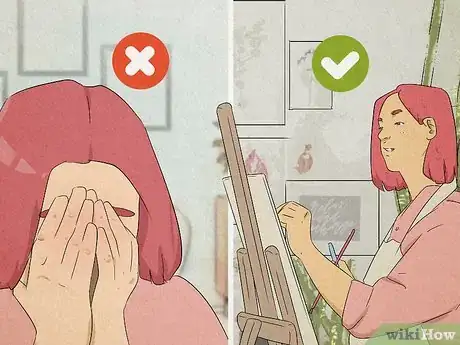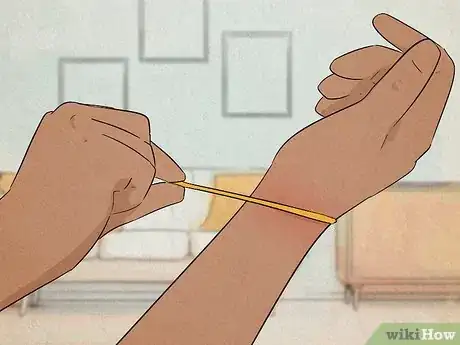This article was co-authored by Klare Heston, LCSW. Klare Heston is a Licensed Independent Clinical Social Worker based in Cleveland, Ohio. With experience in academic counseling and clinical supervision, Klare received her Master of Social Work from the Virginia Commonwealth University in 1983. She also holds a 2-Year Post-Graduate Certificate from the Gestalt Institute of Cleveland, as well as certification in Family Therapy, Supervision, Mediation, and Trauma Recovery and Treatment (EMDR).
There are 10 references cited in this article, which can be found at the bottom of the page.
wikiHow marks an article as reader-approved once it receives enough positive feedback. In this case, several readers have written to tell us that this article was helpful to them, earning it our reader-approved status.
This article has been viewed 152,307 times.
You may not have heard of the concept of rumination, but, chances are, you’ve fallen prey to this habit. Rumination comes from a Latin term meaning “chewing the cud”, which is what a cow does when it chews, swallows, regurgitates and chews its food again. In human terms, rumination can be described as obsessive thinking. Something bad happens and you run the whole situation through your mind over and over and over again. This form of thinking can ultimately lead to depression, so overcoming it is an important step for improving your mental health.[1]
Steps
Shifting Your Focus
-
1Search for the lesson. Even negative events that happen in your life are learning opportunities. Humans learn from trial and error, which isn’t possible without some negative events to help to push us to be creative and innovative. Focus on the chance to grow and learn from each experience.[2]
- Learn to separate yourself from things that happen to you. Instead of assuming bad things only happen to bad people, realize that bad things do happen every day and it is up to you how you react. You can look at the negative as just an experience that you can learn from. Don’t take the event personally about who you are overall and move forward.
-
2Ask yourself what’s the worst that can happen. Thinking about what’s bothering you in this way can remove some of the power of your fears. The biggest part of the fear is running every scenario through your brain to the point of exhaustion. Taking a realistic approach can help. Figure out what is the worst possible outcome and then realize that, even if it were to occur, it is not the end of the world.
- This type of negative thinking can give you very real physical pain, may lead to trouble sleeping and other issues. It is important to find a way to work past the fear and live without these symptoms.[3]
Advertisement -
3Remove the trigger. Sometimes, you might ruminate after encountering a certain stimulus. Look closely at your rumination behaviors and determine which triggers are causing them. Then, find ways to remove the stimulus.
- A good way to start to look at triggers is to keep a journal and write down each time you fall into this behavior. In the moment, record what thoughts or experiences started the process and this would be a trigger for you.[4]
- An example of a trigger could be a visit from your mother-in-law. If you share a rocky history, you may obsess over her next unannounced visit because you fear it will end badly.
-
4Find helpful replacements. Changing a bad habit is best achieved by locating another behavior—ideally, a healthier one—that could meet the same objective.
- For example, if you tend to worry a lot about emergencies, take some time to get yourself prepared so you know even in an emergency you are OK. Put your thoughts to good use and take it a step further by helping others prepare for these events as well. It is a great distraction from running the worst case scenario in your head over and over.
Managing Worries
-
1Practice mindfulness. This means getting in touch with your thoughts, actions and reactions. This is also a process that uses calming activities like yoga to move past stress and not focus on the negative.[5]
- Understanding that you have a tendency to overthink things is a huge step towards being mindful because you can attribute much of your stress to this habit and not to actual events. Awareness relating to the outcomes of the stress will also help in learning to not let the stress hurt you physically.
-
2Schedule a daily worry period. You may not be able to completely stop the obsessive thoughts but you can isolate them to a short part of your day.
- Set aside 30 minutes each day to sit down and write about what is worrying you. Remind yourself if these worries come up during the rest of your day that you will think about the stressor only during that worry period.[6]
-
3Get active. Physical activity can help you reduce stress and improve your mood. Exercise releases feel-good chemicals in the brain called endorphins that improve your mood.[7]
- Taking a long brisk walk to get the blood flowing or sweating for an hour at the gym is a solid distraction and also a way to cleanse the body of toxins. Many people see sweating as a freeing process as well as it is also a natural high.
-
4Start a journal. Write about your fears and also about what really ends up happening so in the future you can compare the two. This will help to show you how much worse you make the problem by thinking the worst when it doesn’t always happen.[8]
-
5See a therapist for particularly stubborn thoughts or memories. If your obsessive thoughts are interfering with daily life, it may be wise to seek help from a professional.[9]
- Treatments for rumination can include counseling, EMDR (Eye Movement Desensitization and Reprocessing), and behavioral interventions. There are also prescription drugs one can take to calm obsessive thoughts.
Developing a Healthier Attitude
-
1Share your burden with others. Trust a friend, especially someone who's survived similar situations. He or she may have a lot of good tips on how to handle it. Support groups of individuals with depression or rumination disorder are very good for gaining confidence and eliminating the shame or stigma associated with these conditions.
-
2Overcome perfectionism. Having the mindset that everything you do must be done to an ideal standard will cause both mental exhaustion and anxiety. Changing a perfectionistic attitude starts with accepting that mistakes and flaws are inevitable.[10]
- Learn to spot perfectionism in yourself. Do you often have trouble meeting your own standards or only do so with immense time and effort? Do you frequently feel down in the process of trying to meet your own standards?
- You can adopt a more realistic perspective by reminding yourself with certain phrases like “Everybody makes mistakes!” or “I’m only human!” Try doing this when you make a mistake or fall short of your expectations. Over time, you will be less hard on yourself.
-
3Release your need to control everything. Change what you can and learn to accept what you can’t. Practice new reactions to stressful situations and challenge yourself over time to end the obsessive thoughts.[11]
- Work with friends and family to explore ways you can let go of triggers you tend to want to control. Having support of loved ones can be nice and it also adds another level of accountability.
-
4Direct your attention towards the positives in your life. You learn from both the positives and negatives in life, but for someone who is obsessing you usually focus more on the negative.[12]
- Take time each day to write down three things that were really great or happy about your day. Take the time to share these “wins” with loved ones and make it a priority. You can also ask them to participate and start to have more positive conversations.
-
5Use behavioral interventions to redirect your negative thoughts. You may not even be fully aware of how often you have these thoughts until you take this step. These interventions are geared at helping you spot your old unhealthy thinking patterns and adopt a healthier, less obsessive mindset in their place.
- This can be as simple as wear a rubber band on your wrist and snapping it each time you catch yourself thinking about it when it is not time to do so. [13] .
Expert Q&A
-
QuestionHow do I stop beating myself up over mistakes I made on my wedding day?
 Klare Heston, LCSWKlare Heston is a Licensed Independent Clinical Social Worker based in Cleveland, Ohio. With experience in academic counseling and clinical supervision, Klare received her Master of Social Work from the Virginia Commonwealth University in 1983. She also holds a 2-Year Post-Graduate Certificate from the Gestalt Institute of Cleveland, as well as certification in Family Therapy, Supervision, Mediation, and Trauma Recovery and Treatment (EMDR).
Klare Heston, LCSWKlare Heston is a Licensed Independent Clinical Social Worker based in Cleveland, Ohio. With experience in academic counseling and clinical supervision, Klare received her Master of Social Work from the Virginia Commonwealth University in 1983. She also holds a 2-Year Post-Graduate Certificate from the Gestalt Institute of Cleveland, as well as certification in Family Therapy, Supervision, Mediation, and Trauma Recovery and Treatment (EMDR).
Licensed Social Worker First of all, try reframing that: How do I stop beating myself up over things that didn't go well on my wedding day. Wedding days are notorious for things going wrong because we are all human, and there are so many intervening factors at play. The most important thing is to examine how things are going today. Are you happy? Did you make a good choice in your partner? Try to leave the past in the past with some of the techniques outlined in this article.
First of all, try reframing that: How do I stop beating myself up over things that didn't go well on my wedding day. Wedding days are notorious for things going wrong because we are all human, and there are so many intervening factors at play. The most important thing is to examine how things are going today. Are you happy? Did you make a good choice in your partner? Try to leave the past in the past with some of the techniques outlined in this article. -
QuestionI have missed different social events for various reasons and keep speculating on what I missed out on. How can I stop focusing on my social failings?
 Klare Heston, LCSWKlare Heston is a Licensed Independent Clinical Social Worker based in Cleveland, Ohio. With experience in academic counseling and clinical supervision, Klare received her Master of Social Work from the Virginia Commonwealth University in 1983. She also holds a 2-Year Post-Graduate Certificate from the Gestalt Institute of Cleveland, as well as certification in Family Therapy, Supervision, Mediation, and Trauma Recovery and Treatment (EMDR).
Klare Heston, LCSWKlare Heston is a Licensed Independent Clinical Social Worker based in Cleveland, Ohio. With experience in academic counseling and clinical supervision, Klare received her Master of Social Work from the Virginia Commonwealth University in 1983. She also holds a 2-Year Post-Graduate Certificate from the Gestalt Institute of Cleveland, as well as certification in Family Therapy, Supervision, Mediation, and Trauma Recovery and Treatment (EMDR).
Licensed Social Worker Try to accept your choices on a daily basis. Either choose to go or not go to various gatherings. We might always miss out on something, but perhaps for you it's more productive to focus on what you gained by opting not to go. Did you have a calm evening? Did you take care of your cold instead of getting out? Try some meditation or yoga to help feel more centered.
Try to accept your choices on a daily basis. Either choose to go or not go to various gatherings. We might always miss out on something, but perhaps for you it's more productive to focus on what you gained by opting not to go. Did you have a calm evening? Did you take care of your cold instead of getting out? Try some meditation or yoga to help feel more centered.
Warnings
- If your thoughts start to intrude on your normal daily activities and/or stop you from sleeping at night, consult your doctor.⧼thumbs_response⧽
- If counseling and therapy don't help, start searching for a different counselor or therapist. Be aware that differences in religious views, ethics, culture and background between therapist and client can interfere with even a good therapist's ability to help.⧼thumbs_response⧽
- Try seeking out a therapist who does EMDR, which can help you process distressing thoughts or memories.⧼thumbs_response⧽
References
- ↑ http://www.apa.org/monitor/nov05/cycle.aspx
- ↑ http://www.healthcentral.com/anxiety/cf/slideshows/8-ways-to-stop-obsessing-or-ruminating#slide=8
- ↑ http://www.healthcentral.com/anxiety/c/157571/118395/stop-ruminating/
- ↑ https://www.psychologytoday.com/blog/mood-thought/201307/four-tips-habit-research-reduce-worry-and-rumination
- ↑ http://greatergood.berkeley.edu/topic/mindfulness/definition
- ↑ http://www.healthcentral.com/anxiety/cf/slideshows/8-ways-to-stop-obsessing-or-ruminating#slide=4
- ↑ http://www.healthcentral.com/anxiety/c/157571/118395/stop-ruminating/
- ↑ http://www.healthcentral.com/anxiety/cf/slideshows/8-ways-to-stop-obsessing-or-ruminating#slide=5
- ↑ http://www.healthcentral.com/anxiety/cf/slideshows/8-ways-to-stop-obsessing-or-ruminating#slide=10
- ↑ https://www.anxietybc.com/sites/default/files/Perfectionism.pdf
- ↑ https://www.psychologytoday.com/blog/mood-thought/201307/four-tips-habit-research-reduce-worry-and-rumination
- ↑ http://psychcentral.com/blog/archives/2014/02/16/8-tips-to-help-stop-ruminating/
- ↑ http://www.healthcentral.com/anxiety/cf/slideshows/8-ways-to-stop-obsessing-or-ruminating#slide=5
About This Article
The best way to stop ruminating is to focus on the lesson to be learned, and to separate yourself from your triggers. Manage your worries by meditating, exercising, and setting aside a specific and limited daily “worry time.” Develop a more positive attitude by letting go of control and perfectionism and confiding in others. For more techniques on how to start journaling and setting aside worry-free time from our Social Worker co-author, keep reading!













































































Medical Disclaimer
The content of this article is not intended to be a substitute for professional medical advice, examination, diagnosis, or treatment. You should always contact your doctor or other qualified healthcare professional before starting, changing, or stopping any kind of health treatment.
Read More...